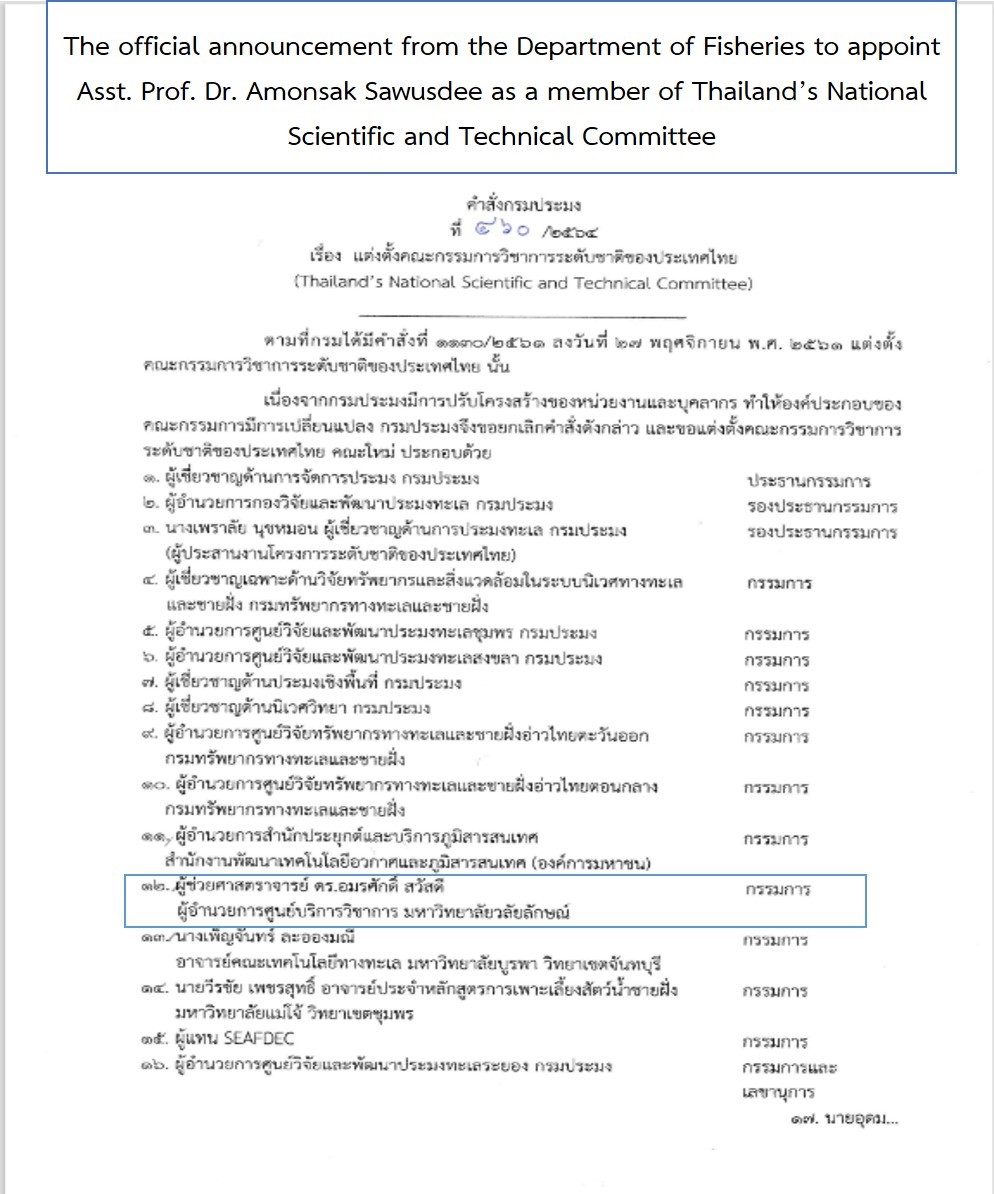WU’s Researcher Establishes National and International Partnerships to Mobilize Thai Fishery Towards Sustainability
In 2024, Asst. Prof. Dr. Amonsak Sawusdee, Director of the Center for Academic Services (National partner) and Lecturer of the School of Marine Science, was appointed by the Department of Fisheries (National Partner) as a member of the Technical Committee on the Assessment for Sustainability and Appropriate Reference Point. The committee was established to issue policies and guidelines for determining a reference point for sustainable aquatic animal management. In addition, this committee partners with Hokkaido University (International partner) through Prof. Takashi Fritz Matsuishi, who serves as an advisor.
In addition, Asst. Prof. Dr. Amonsak Sawusdee has been appointed by the Department of Fisheries to become a member of three national committees that are still working on Thai fishery improvement towards sustainability. The committees include:
1. Thailand’s National Scientific and Technical Committee
2. The Sustainable Blue Crab Management Committee of Thailand
As a member of the National Scientific and Technical Committee of Thailand, Asst. Prof. Dr. Amonsak Sawusdee is responsible for advising on fisheries plans in Thailand, including preventing overfishing and minimizing the impact of fisheries on aquatic ecosystems: physical, chemical, and biological aspects.

He also has been engaging with various NGOs to tackle SDG challenges, especially SDG 14. The NGOs include the Federation of Thai Fisher Folk, the Thai Sea Watch Association, the World Wide Fund for Nature (WWF), the Global Environment Facility (GEF), the Local Fishery, the Ban Nai Thung Local Fishery Association, and others.

Regarding his role as a member of the Sustainable Blue Crab Management Committee of Thailand, he is one of the researchers who are responsible for drafting the country’s fisheries strategy and preparing a plan to manage the blue crab resources in areas for sustainable utilization of marine resources, working with the national government organization and marine researchers across Thailand. Currently, the committee is developing a strategy for sustainable fishery development.
In addition, Asst. Prof. Dr. Amonsak Sawusdee, as a member of the Site-Based Fishery Refugia Management Board in Surat Thani Province, has been working with the Department of Fisheries on a program to set guidelines and comparative approaches to restoring resources and upgrading the blue crab fishery to meet international standards. The program is called “Fishery Improvement Program: FIP” and operates in Ban Don Bay, Surat Thani. For the program, Asst. Prof. Dr. Amonsak Sawusdee, as a member of the national committee, is responsible for developing strategies to reduce the impacts of overfishing, including:
- Encouraging local fishermen to catch blue crabs larger than 10 cm in size and deposit berried female blue crabs at local blue crab banks to increase the blue crab supplies
- Promoting blue crab bank projects in all areas with abundant natural resources across Surat Thani, including Tha Chana District, Chaiya District, Don Sak District, and Kanchanadit District
- Promoting all local fishermen to release more young blue crabs at places that have suitable environments and sufficient food during the primary reproductive phase
- Continuing research conducted in tracking and creating a database to record the number of fishing gears resulting in ghost fishing reduction
- Raising awareness among fishermen to prevent illegal fishing of blue crabs and to have conservation areas for crab nursery ground
- Promoting ecological cleaning activities in sensitive areas to collect lose and discard fishing gear at Ban Don Bay
- Raising awareness among fishermen to use legal poaching 2.5-inch nets reducing the effects of lost fishing gear at sea.
- Developing practices and policies for local fishermen to increase the spawning potential ratio (SPR) for determining the minimum landing size
- Organizing campaigns for local fishermen to not catch young blue crabs and berried female blue crabs
- Raising awareness among fishermen to prevent regulating activities on shore that cause additional heavy metal accumulation.
- Monitoring of the blue crab population to know resource conditions and appropriate management practices regularly


Goal 17: Partnerships for the Goals
Goal 14: Life below water
Goal 15: Life on land

